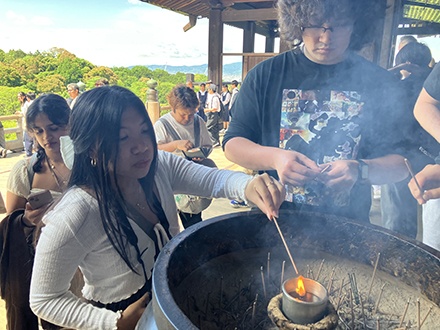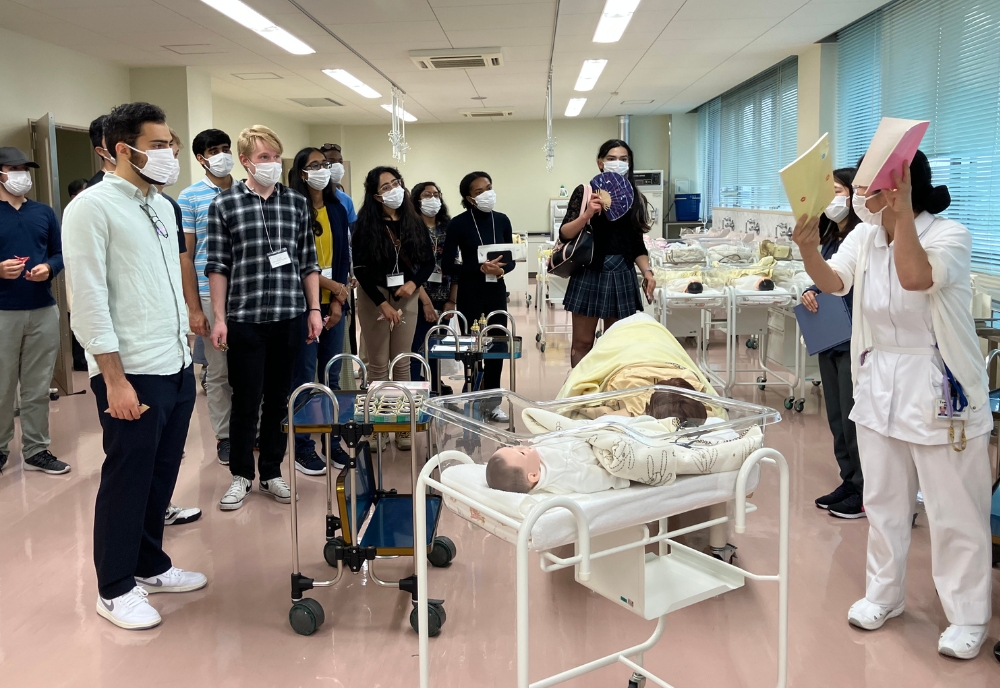College of Arts and Sciences students also enrolled in the Judy Genshaft Honors College gained new insights about the history and culture of care in Japan this summer as part of the “Beyond the Classroom” study abroad experience offered by the Honors College.
The two-week experience held in May focused on medical humanities and included stops in the cities of Gifu, Osaka, Kyoto, Nara, and Tokyo.
The course provided an overview of both customary and modern practices in Japan to shine a light on what it means to “care” for others in a country that is currently facing serious social issues including suicide, overwork, and unbalanced demographics.

Visiting the Kiyomizu Temple in Kyoto. (Photo courtesy of Atsuko Sakai)
Gifu University and its related medical departments, as well as many other key partnering institutes, provided the immersive experiences for students.
“The most impactful aspect for the students and me was the interaction and connection with people,” said Atsuko Sakai, Honors faculty who led the students on the trip. “For example, we had an architecture and design workshop in the Osaka Castle area with local children in collaboration with Japanese NPOs from Osaka and Sendai (A+C Design LABO Kansai and Architecture & Children Network of Sendai).”
Sakai also emphasized that partners such as Gifu University and non-profit organizations were vital to the success of the program.
“Programming of an education abroad program takes time, and this trip was greatly supported by many groups and individuals,” she said. “I am grateful for their warm support and wonderful hospitality. Meeting these people made our trip special.”
For psychology student Dana Smith, who is also minoring in Spanish and public health, the opportunity to study abroad was something she could not pass up.
“I realized that one of the benefits of study abroad trips is that they help facilitate experiences that you otherwise might not have if you visited outside of the program,” Smith said.
Smith said the days began early and varied in scope, but all the experiences focused on showcasing the medical humanities of Japan, with numerous visits to medical facilities at Gifu University. They also made stops at key landmarks and revered sites in each city as well.
“The course that this trip was based on focused on some of the medical innovations, as well as public health issues, in Japan. My current interest of study is in the area of cognitive aging, so the experiences I had, particularly visiting Gifu University and talking to faculty there gave me some insight into Japan's approach to their rapidly aging population,” Smith said. “I think their perspective of the aging process and care for the elderly has influenced what I want to study in the future regarding cognitive aging.”
“Before this trip, I had never been anywhere as different from my current culture as Japan. I had been to many places in Europe, most notably Bulgaria as my mother is from there, but never somewhere like Japan. I was kind of expecting to be overwhelmed by how foreign everything would feel to me, but I wasn't. Yes, things were different in notable ways, but you get used to it very quickly. Though cliche, this subtle realization has really expanded my worldview in that now I feel like when I am exposed to different cultures they no longer feel as foreign to me as they used to. I learned that if I was ever to be introduced to a different culture or way of life, I would probably adapt quite easily to it,” Smith added.
For biomedical sciences student Jasmine Haroun, traveling to Japan provided her new insights into how Japan’s lifestyle differs from that of the U.S. regarding pharmacy practices — a field she hopes to one day work in.
“I was very interested to learn about Japan's public health initiatives and systems and how they treat patient advocacy as well as prescribing practices. Japan has both contemporary and traditional health practices, so it was very interesting to see a culture that focuses more on preventative medicine rather than reactive medicine, which is something I'd like to learn and practice as move forward with my academics and career,” she said.
She added that traveling to Japan has given her new confidence in facing the unknown and making new connections.
“The actual experience far exceeded my expectations for this trip. It was planned out so well by Professor Sakai. Something I definitely underestimated was the connection we'd make with the Gifu University students. When we were in Gifu, we got to meet fourth-year medical students, third-year nursing students, and then first-year medical students,” she said. “I underestimated this connection because I thought the language barrier would be difficult to overcome, however, their English was very good, and with Google Translate as well as our program leader’s helpful language guide, we were able to talk about our hobbies, favorite foods, day-to-day experiences, family, etc. I'm still in touch with most of them, which is something I would not have experienced otherwise.”
She said her most memorable and impactful parts of the experience were participating in workshops with Gifu University students. She also enjoyed a visit to the riverside town of Gujo-Hachiman where they witnessed nutritional practices and school lunch preparations for elementary school students.
“I found myself learning to be adaptable, which is a skill I feel I've strengthened on this trip,” Haroun added. “My advice for other students considering to study in Japan or anywhere else, is to go ahead and do it. Any experience in a different environment has so many learning opportunities whether that's learning more about the place, the people, or yourself (and these far outweigh any fears or hesitations you may have before going). I'd also advise trying to learn the basics of the language because in most places you visit, the attempt at trying to speak their language is appreciated.”
Learn more about other study abroad opportunities in Japan.
